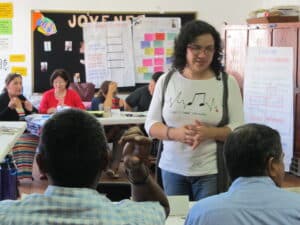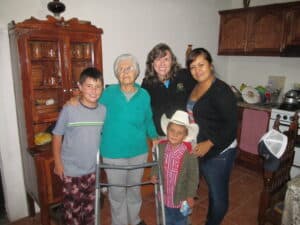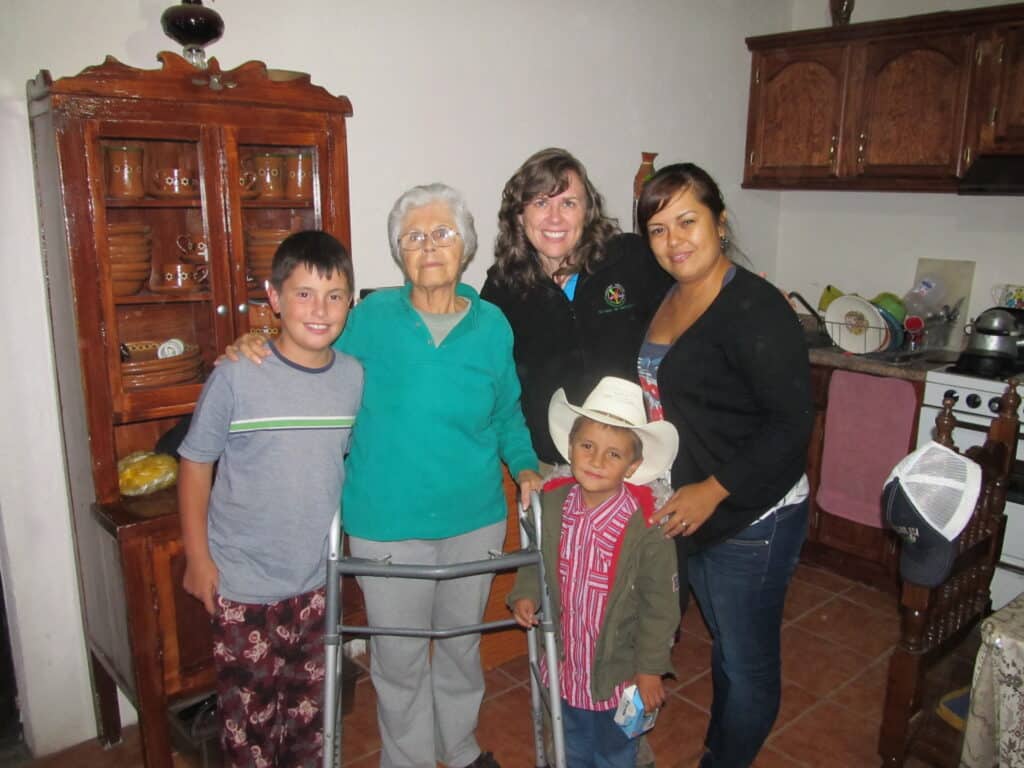Longing
By Evan Huegel, Mercedes Cadena and Elena Huegel who serves with the Intercultural Research and Studies Institute (INESIN) in Mexico

Last year, the topic of dignity kept coming up as I interviewed the facilitators of the Retoños en las ruinas: esperanza en el trauma (Roots in the ruins: hope in trauma) program at the Institute for Intercultural Studies and Research here in Chiapas as well as in other parts of Mexico, Chile, Honduras, Nicaragua, and Puerto Rico. Rodrigo, from Chile, suggested that a year-long dignity journal might be helpful as we continue to walk own healing paths as well as in our accompanying of others. When my nephew, Evan, a recent graduate of a theological program; Mercedes, a teacher and creative learning specialist; Suhey, a Spanish literature student and budding editor (all participants in the Roots in the ruins program); and I began to design an interactive journal with key words as clues to the broader understanding of dignity, unexpected themes from the Hebrew Bible as well and from our personal stories emerged. We recognized that dignity is often nourished and strengthened in the preparation of food and sharing of a meal around the table. For the past few months, we have been gathering recipes and personal testimonies that highlight the dignity from Retoños participants as well as other folks throughout Latin America and other regions of the world. Reflections from the Hebrew Bible, recipes and testimonies along with art, meditation and integration exercises, invite us into a deeper understanding of dignity. The editorial team is working hard to have this book ready by the end of the year under the title: El sazón de la dignidad, una bitácora para alimentar nuestras relaciones durante un año (The Flavor of Dignity: a journal to feed our relationships during the year.) We look forward to the journal becoming a part of the work the Institute of Intercultural Studies and Research in “Ichel ta muk,” the way the Tseltal Mayans express dignity: I see greatness (in me, in you, in all that God has created.)
As a foretaste of this work, I would like to share with you one of the reflections written by Evan with help from Mercedes, both a part of the Retoños team. This entry will be about discovering dignity in the midst of longing and grief.
Key dignity word: Longing
Hebrew Bible theme: To cry out (zaw-ak’) זָעַק
Reflection texts: Exodus 2:23-25, Judges 6:1-6, Habakkuk 1:2-4, Psalm 22
Reflection from the Hebrew Bible:
If you have ever read through the Psalms, you may have been struck by how lament is present throughout the texts. In fact, the Old Testament is replete with lament, from the prophets, to Job, to a book called Lamentations in our English/Spanish bibles. What are we to do with this? These laments somehow become an important message that God wants to share with us. What do these laments have to say to us? Laments are one of the ways in which God’s people are to relate to the divine. By expressing the pain we feel at seeing the injustices, evils, and destruction in the world, we, in a very real way, express the very heart of God. Our hearts break in reflection of God’s broken heart over these devastating situations. As we join in this age-old practice of lament, we are challenged to hope. To lament is to hope. While there are a myriad of words that can be used to describe this kind of lamenting action, one that can be helpful to pay attention to is זָעַק (zaw-ak’), or to “to cry out.” A child will cry when they have a need with the expectation that their caretaker will hear and meet that need. If the child is ignored time and time again, they will cease to cry because there is no hope of having those needs met. One of the most dangerous things that can happen in the face of oppression occurs when the oppressed cease to cry out: the demand for justice, dignity or shalom is silenced by repression or indifference. We lament, therefore, as a way of hopeful resistance, resisting the evils of injustice and violence caused by others and by ourselves. We express our pain and longing to declare our needs, the needs of others, and the needs of this earth before our Caretaker with the expectation that the Brokenhearted One will bring restoration.
Reflection through a recipe: Mandarin Orange Bread from Mercedes Cadena
Ingredients:
- 1/2 cup of strained mandarin orange juice (120ml)
- Zest of 2 or 3 mandarin oranges
- 2 sticks of butter at room temperature
- 4 eggs at room temperature
- 2 cups of all-purpose flour
- 3/4 cup of brown or standard sugar
- 1 1/2 tablespoons of baking powder
- Pinch of salt
- 1/2 teaspoon of vanilla extract
Instructions:
- Sift all the dry ingredients.
- Beat the butter with the sugar until creamy using a whisk or mixer.
- Add the eggs one by one, continuing to beat.
- Incorporate the mandarin zest and juice.
- Add the dry ingredients in 2 or 3 parts and mix without overbeating.
- Pour the mixture into a non-stick or previously greased and floured mold.
- Tap the mold lightly to remove air bubbles and ensure an even mixture.
- Bake in a preheated oven at 180°C (355°F) for around 45 minutes or until a toothpick inserted comes out completely dry.
Reflection through a personal Testimony from Mercedes Cadena:

My name is Merecedes, but people call me Meche, and I am the youngest daughter of schoolteachers. I remember hearing my older siblings talk about how our mother used to get up early to bake bread and create wonderful homemade meals for them. By the time I was growing up, many of our meals were eaten at the local family-owned economy kitchens. Part of me laments that my parents did not have the time or energy to continue those family traditions, but the loss made me appreciate my mother’s cooking in a special way, and I guess my siblings feel the same way. We have all dabbled in the kitchen. As my parents got older, I knew that I wanted to preserve the legacy of my mother’s cooking and baking, so I bought my mother a notebook to write down her recipes. She was unable to complete it before she passed away. Not having her recipes written down sits as a place of grief for me. Not long after she died, my father also became ill with a sickness that affected his body and his mind. In preparation for one of my visits, I made mandarin bread like my mother and grandmother used to make. To my surprise, as he took a bite of the bread he began to cry. He looked at me and said, “This tastes just like how my mother used to make it.” I had heard stories of my grandparents, and I made it a point to learn as much as I could about them, but I never actually met them. Tearing up and crying in lament has become something of a repeated theme in my cooking. I am thrilled, and yet I grieve, at the many times I have received the greatest of compliments: that my food tastes like my mother’s. I may not have the recipe book I wanted, but I do have the heart and hands of my mom and the adventure of exploring what her recipes may have been like as I serve food to my family members and watch their taste buds light their eyes and hearts with memories of my parents and grandparents.
Elena Huegel serves with the Intercultural Research and Studies Institute (INESIN) in Mexico. Her appointment is made possible by your gifts to Disciples Mission Fund, Our Church’s Wider Mission, and your special gifts.

